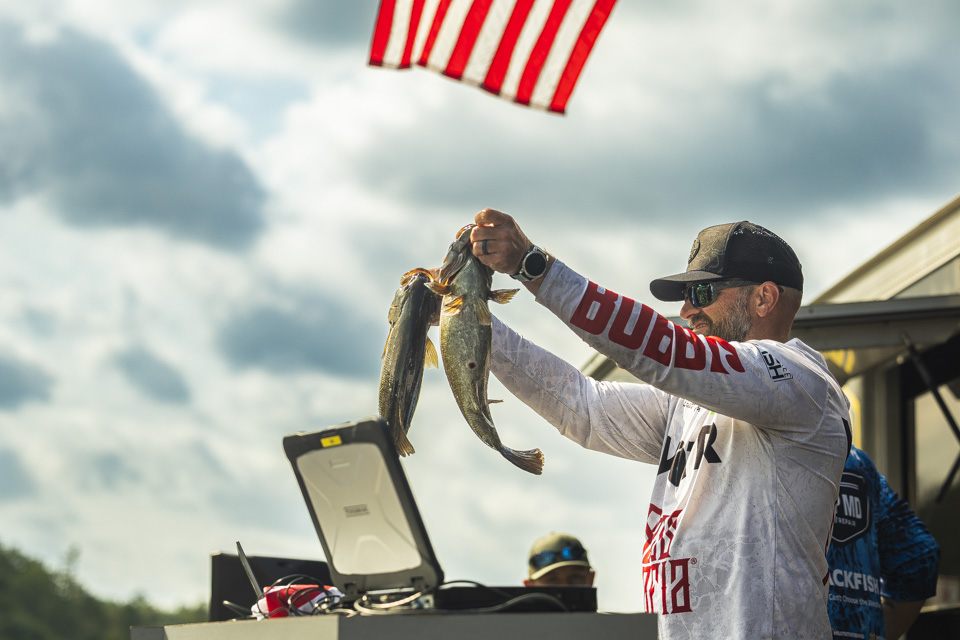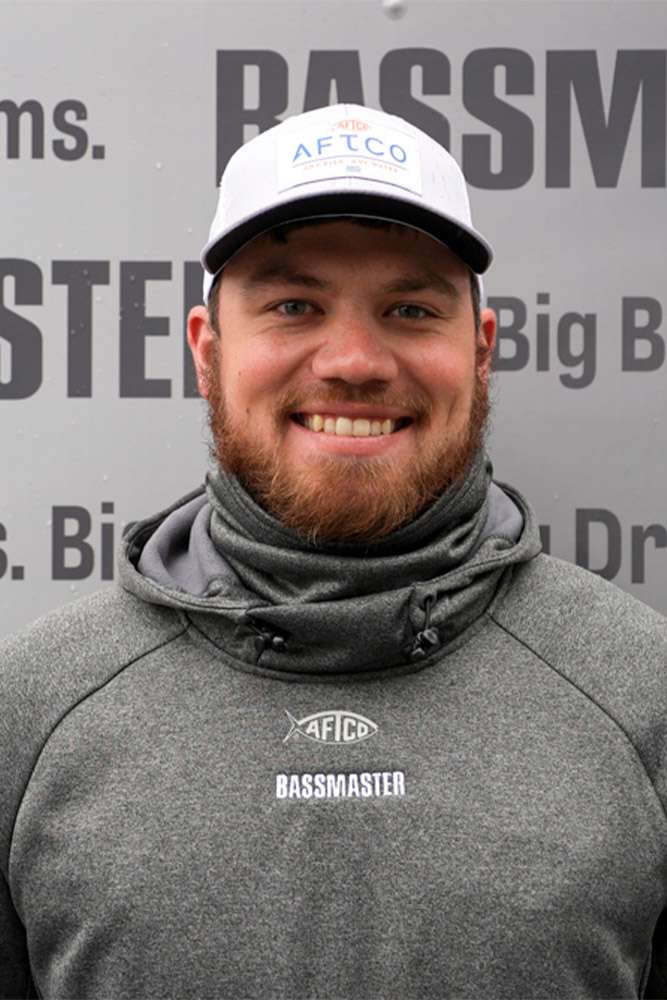
Living in New York state, Billy Gilbert has plenty of experience fishing for smallmouth. He lives just south of Buffalo close to Lake Erie and has spent time on Ontario, Oneida and Champlain to name a few.
But this week at the St. Croix Bassmaster Open at Leech Lake presented by SEVIIN, Gilbert has discovered Leech Lake smallmouth are much harder to catch than he expected.
“I fish for a lot of smallmouth,” he said. “They are bottom-oriented. They don’t chase bait like they do at Champlain. I’m used to bottom-oriented bass, but it is hard to get them to fire. Maybe its because of dirtier water and maybe pressure from the walleye boats. I honestly don’t know.”
Gilbert was one of many anglers who mentioned how difficult it was to get a bite on Day 1 of the tournament. Still, he sits in sixth with a limit of smallmouth measuring 21 pounds, 5 ounces and Leech Lake showed just how many quality bass swim under the surface.
With Easton Fothergill leading the charge with 26-10, and the 6-4 Big Bass of the Day, ten bags over 20 pounds were brought to the scales, all of them consisting of big brown bass.
On a lake that doesn’t see a ton of pressure from bass anglers, but an extraordinary amount of pressure from anglers seeking walleye, it would stand to reason the smallmouth would be easier to get to bite. That does not seem to be the case for most anglers, except for Fothergill who caught close to 20 bass on the day.
“I got six bites today,” 5th place Jimmy Washam said after landing 21-12. “The brown fish have just been pressured (this week) I knew it would be a risk going into this. I’m not seeing a lot of them and it is hard to get them to bite. You have a lot of them look and not bite. When you get the bites, you sure have to capitalize on it.”
It could be the two theories that Gilbert suggested, but there is another aspect to consider. Rusty crayfish coat the bottom of Leech Lake, giving the bass plenty of forage to snack on at any point in time. The way the smallmouth are built is different than anything Lucas Murphy has seen.
“I’ve never seen bodies so big on smallmouth with such a small mouth,” Murphy said. “At St. Clair a month ago, I caught smallies that had the mouth of a largemouth. They eat a lot of perch there. Here, it is all crawfish. Their body gets huge, and the mouth doesn’t quite follow. I had a couple in practice that when I hooked them, they didn’t look big. Even today, my biggest one was close to 5 and if I had lost it, I would have told you it was a 3-pounder.”
With so much forage, the smallmouth don’t have as much incentive to eat an artificial lure. That is why anglers like Emil Wagner and Austin Cranford think the morning bite is so critical.
“I went to my starting hole and I had a limit in about an hour. One of them was a 5-pounder,” Wagner, who brought in 22-2 on Day 1. “From 8:30 to 10:30, I culled five more times and had my weight by 11:30. I think why I did so good in the morning was they had that day of no pressure with the weather. It is hard to say if you can do it again because it is so tough. Just catching five smallmouth is not easy.”
Meanwhile, Washam thinks he knows which type of rock the bigger smallmouth prefer to set up on while second-place Brett Cannon has honed in on a particular bait.
Running and gunning
To amass his giant Day 1 bag, Fothergill stayed on the move and hit as many productive places as he could during his tournament day.
“I hit a whole bunch of places. I have like 5 gallons of gas left in my boat,” he explained. “(Day 2) I’ll have the same gameplan. I’ll run to every corner of the lake and see if I can find five big ones again.”
Part of Gilbert’s success also involved jumping from rock pile to rock pile.
“I just run and gun. I have a bunch of isolated rock within a four-mile stretch. I normally catch them when I first roll up, so I roll up while they are setup and once they disperse they are harder to catch.”
Cranford overcomes mechanical problems to land in Top 10
When Cranford arrived at his first spot this morning, he quickly discovered his trolling motor did not work. Fortunately, he saw a 4 1/2 -pounder on his forward-facing sonar and landed that bass before he had to make a run to the service yard.
After an hour and a half of troubleshooting, Cranford returned to the water and caught 18 pounds in 10 minutes off isolated boulders to finish the day in 8th with 20-11. Things have changed for the Oklahoma angler every day of the event and he has needed to adapt to what the bass are doing.
“Every day has been different,” he said. “It is whether they are shallow, deep or in between. Today they changed like three times, and I had to follow them. I caught them deep to start, and then I caught them shallow and when it slicked off, I caught them in between. I really wasn’t sure what the wind (Thursday) was going to do to them. It definitely moved some of the bass around and I couldn’t relocate my big school.”





